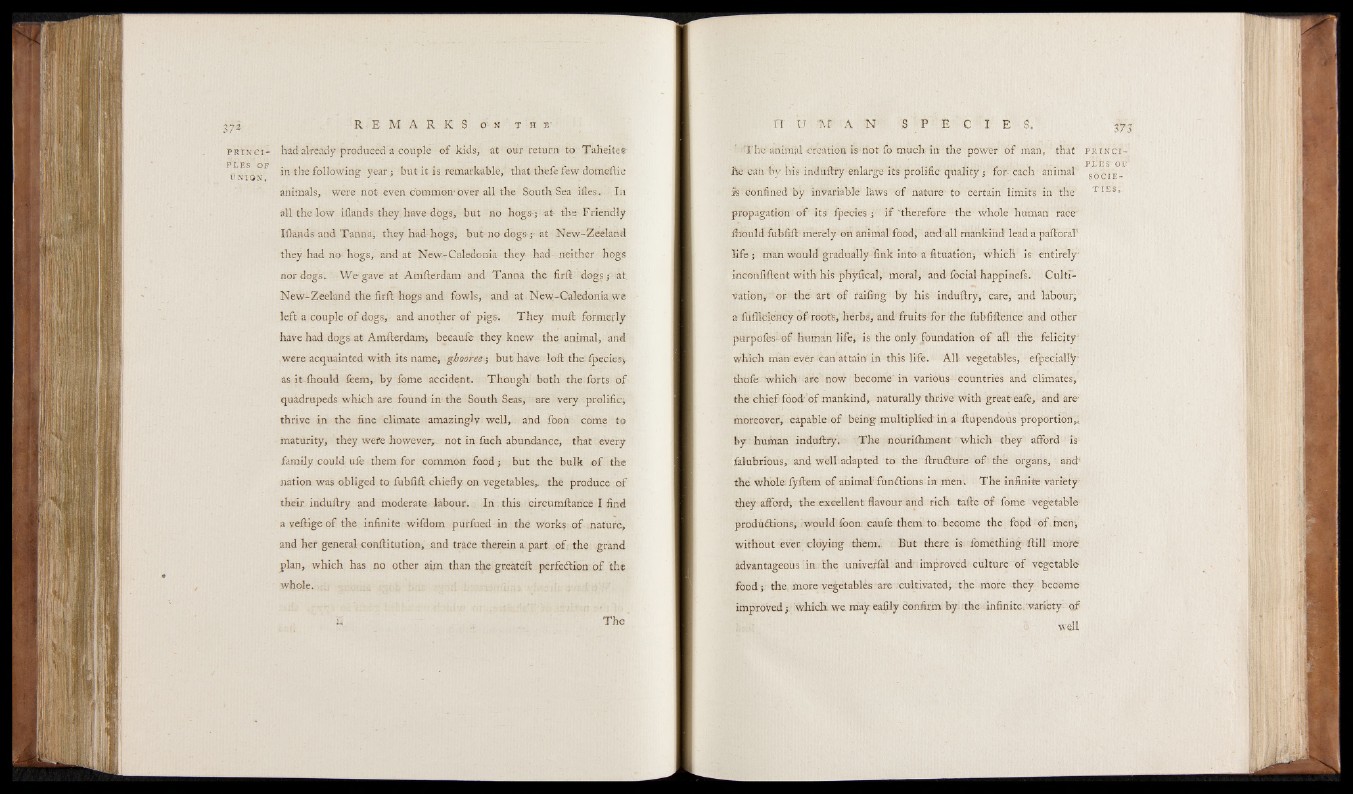
3 7 2 R E M A R K S on t h e '
P r i n c i p
l e s o f
U N IO N .
had already produced a couple o f kids, at our return to Taheites
in the following year; but it is remark-able, that thefe few domeftie
animals, were not- even common1 over all the South Sea idles. In
all the low iflands they have dogs, but no hogs-; at the Friendly
Iflands and Tanna, they had hogs, but no dogs-;-at New-Zeeland
they had no- hogs, and at New-Caledonia they had- neither hogs
nor dogs. W e gave at Amfterdam and Tanna the firft dogs;-at
New-Zeeland the firft hogs and fowls, and at | New-Caledonia we
left a couple o f dogs, and another o f pigs. T h e y muft formerly
have had dogs at Amfterdam; beeaufe they knew the animal, and
were acquainted with its name, ghooree; but have loft the fpecies;
as it dhould deem, by fome accident. Though both the forts of
quadrupeds which are found in the South Seas, are very prolific;
thrive in the fine climate amazingly well, and foon come to
maturity, they were however,, not in fiich abundance, that every
family could ufe them for common food; hut the bulk o f the
nation was obliged to fubfift chiefly on vegetables,. the produce of
their induftry and moderate labour. In this circumftance I find
a veftige of the infinite wifdom purfued in the works o f nature,
and her general conftitution, and trace therein a part .of the grand
plan, which has no other aim than the gr.eateft perfeftion o f the
whole. .:.
The
The animal creation is not fo much in the power of man, that
he can by his induftry enlarge its prolific quality; for-each animal
k confined by invariable laws o f nature- to certain limits in the
propagation- o f its fpecies; i f 'therefore the whole human race"
dhould fubfift merely on animal food, and all mankind lead a paftoral'
l i fe ; man would gradually fink into a fituation-, which is entirely
inconfiftent with his phyfical, moral, and focial happinefs. Cultivation,
or- the art o f failing by his induftry, care, and labour;
a fufficiency o f roots, herbs, and fruits for the fubfi-ftence and other
purpofes-of human life, is the only foundation o f all the felicity
which man ever can attain in this life. A ll vegetables, efpecialiy-
thofe which are now become in various countries and climates,
the chief food’ Of mankind, naturally thrive with great eafë, and are
moreover, capable o f being multiplied in a ftupendbus proportion,!,
by human induftry. Th e nourishment which they afford is
ialubrious, and well adapted to the ftrudt'ure o f the organs, and'
the whole, fyftem o f animal functions in men. Th e infinite variety
they afford; the excellent flavour and rich tafte of fome vegetable
prodüdtions; would foon. caufe them to become the fopd of .men;
without ever cloying them.. But there is fomething Hill more
advantageous in the univeffal and improved culture of vegetable
food; the more vegetables are cultivated; the more they ■ become
improved; which we may eafily confirm by the infinite.'variety, of
well
P R I N C I P
L E S " OF"
S O C I E T
I E S ,